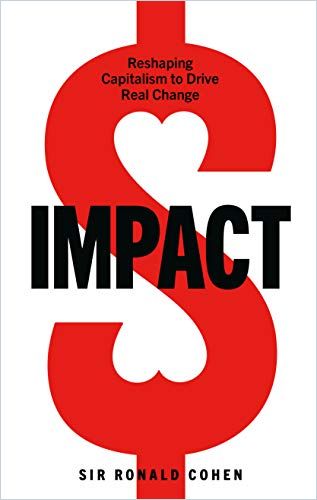Pioneering philanthropist and social financier Sir Ronald Cohen details why the world needs conscious, socially aware profit-making.

Socially Responsible Investing
Pioneering philanthropist and venture capitalist Sir Ronald Cohen offers an impassioned plea for a new way of doing business globally. His prescription calls for an “Impact Revolution” that redirects the profit motive to solve the world’s thorniest problems, such as income inequality and climate change. Both enlightening and inspiring, Sir Ronald’s advice is sound.
Business as Usual
Cohen’s basic proposition is that the world economy is broken – African economic refugees risk their lives to sail to Europe; France, Lebanon and Chile have experienced violent protests; and British voters opted for Brexit. Environmental degradation has run amok. OECD member countries spend $10 trillion per year on health and education, but inequality continues to grow.
As inequality surges in developed and developing countries alike, social tensions rise and those who have been left behind feel that they will be permanently stuck there.Sir Ronald Cohen
Cohen offers an “Impact Revolution” of mindful investment and responsible business practices. This redresses “the tyranny of profit” and weds the money-making motive with social responsibility. As the venture capital model created the technology ecosystem, so the impact model can spawn large-scale solutions to the globe’s problems.
Impact Bonds
The world’s economy could use a blueprint that matches the interests of entrepreneurs and investors with the needs of government and philanthropy.
We cannot change the world by throwing money at old concepts that no longer work – we need new concepts and approaches.Sir Ronald Cohen
Social impact bonds and development impact bonds reposition social issues and ecological problems as investment opportunities. The nonprofit Social Finance, for example, used the corporate bond model to tackle high rates of recidivism among people released from British prisons. Social Finance raised $6.7 million to finance nonprofit providers of services to inmates in HMP Peterborough. If Social Finance failed to reduce the rate of repeat offenses by 7.5% after five to seven years, investors would get nothing. But for reductions of more than 7.5%, bond investors would get their money back, plus a rate of return based on the program’s level of success. The project generated a 9.7% success rate; the British government paid 3.1% on the bonds – a bargain compared to the savings realized by keeping people out of the legal system.
Societal Needs
Zipline’s drone system delivers critical medical supplies in Rwanda, a nation with negligible infrastructure. The company grew its network to supply 80% of Rwanda’s population and then expanded into Tanzania. In 2019, Zipline raised $190 million in Silicon Valley venture funding and gained a $1.2 billion valuation, illustrating that a tech company can profit by saving lives.
I know we will see impact entrepreneurs that match the scale of the tech entrepreneurs’ ambition and success, but surpass them in terms of the positive impact they have on the planet.Sir Ronald Cohen
Cohen regards Elon Musk as the most effective impact entrepreneur, because selling 550,000 Teslas has meant a reduction of 4 million metric tons of carbon dioxide, relative to what standard gasoline-fueled cars emit.
Institutional Investors
The market for addressing environmental, social and corporate governance (ESG) issues has risen to $31 trillion – 15% of the world’s invested assets. Investors are snapping up green bonds, which finance environmental initiatives. The impact investment market grew from $230 billion in 2017 to $502 billion in 2018.
Instead of blaming the private sector, we can exercise our powerful collective sway to change it.Sir Ronald Cohen
Because their yields hinge on whether a social program achieves its goals, social impact bonds don’t move with stock markets or interest rates, which means less volatility. The United Nation’s Sustainable Development Goals, released in 2015, added fresh momentum to impact investing. The UN’s aims – attacking poverty, broadening education, protecting the environment – are ambitious, and achieving them could cost $30 trillion in the 2020s.
Corporate Leaders
In 2019, the Business Roundtable updated its position on the role of corporations in the world economy. For decades, the group – which includes major US multinationals – insisted that “corporations exist principally to serve shareholders.” Its 2019 amendment said corporations also serve customers, communities and employees.
In furtherance of those goals, Coca-Cola puts less sugar in its drinks. Nestlé cuts salt and sugar. Mars offers healthier snacks. Nike and Adidas use more recycled materials.
Businesses that lack impact integrity will run the risk of losing customers, investors and talented employees.Sir Ronald Cohen
Harvard Business School developed the concept of “impact weighting,” which assigns a monetary value to social and environmental initiatives. For example, PepsiCo is a leader and Coca-Cola a laggard when it comes to water use.
Governments
Governments should appoint ministers of impact policy, Cohen writes, as Brazil, France, Canada, Portugal and South Korea already have. Governments must communicate the cost of social issues to create financial transparency. They must also incentivize impact investment by changing regulation and tax treatment to direct the flows of impact capital. And governments should fund early-stage social enterprises.
In the United Kingdom, for example, the Access Foundation created a $133 million fund that directs money to the impact industry. France has a similar project, the $111 million NovESS.
Now
By creating widespread prosperity, the Industrial Revolution and the tech boom lifted billions of people from poverty. But those revolutions have run their course, and the sun is setting on the “selfish capitalism” embodied by neoliberalism.
Impact investment heralds the Impact Revolution, which promises to be as innovative and disruptive as the Tech Revolution that preceded it. Sir Ronald Cohen
The world must overhaul capitalism. A vanguard of impact-minded entrepreneurs, investors, consumers and corporate managers offer a different path forward.
An Impassioned Call
Sir Ronald may come off as a bit pompous and preachy at times, and he provides five examples when one would suffice, but there’s no arguing with his sincerity or his expert grasp of the financial and governmental minutiae that impact investing demands. He offers a blueprint for those new to impact investing, such as economics students or first-time investors looking for less traditional and more socially aware opportunities. His readable text is accessible to generalists but also instructive for experts.
Sir Ronald Cohen also wrote The Second Bounce of the Ball. Other works on impact investing include Sustainable Investing by Cary Krosinsky and Nick Robins, The SRI Advantage by Peter Camejo, and The Triple Bottom Line by Andrew W. Savitz.











